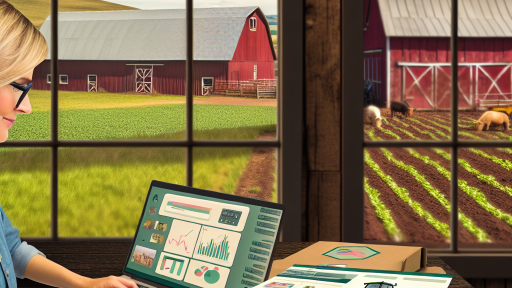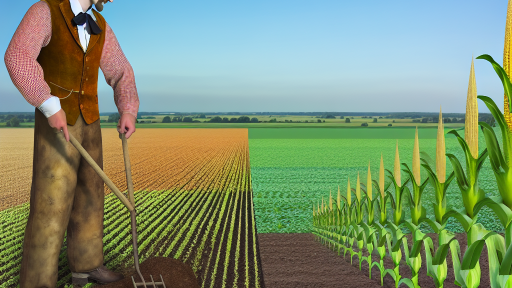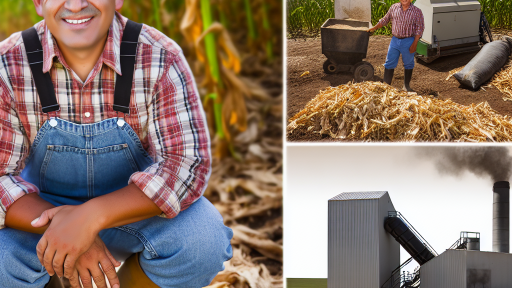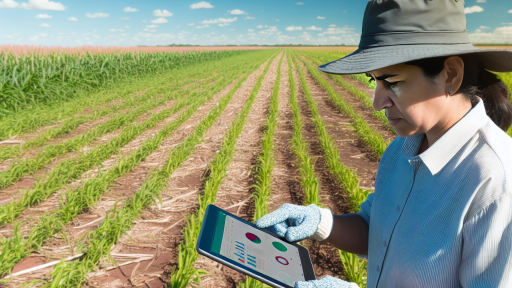Introduction to Agri-Fintech and its Role in Agriculture
Agri-fintech blends agriculture with technology and finance.
This approach fosters innovative solutions for farmers.
Moreover, it enhances productivity and improves financial access.
Farmers face various challenges in today’s agricultural landscape.
Market fluctuations can hinder their profitability.
Additionally, limited access to funds complicates many agricultural ventures.
Agri-fintech platforms address these issues effectively.
They offer tailored financial products for agricultural needs.
For instance, farmers can secure loans quickly through digital platforms.
This process reduces traditional barriers related to paperwork.
Furthermore, these platforms provide valuable insights into market trends.
With accurate data, farmers can make informed decisions.
Agri-fintech also facilitates better supply chain management.
This results in efficient resource allocation and lower costs.
Ultimately, agri-fintech promotes sustainable agricultural practices.
Transform Your Agribusiness
Unlock your farm's potential with expert advice tailored to your needs. Get actionable steps that drive real results.
Get StartedIt empowers farmers to optimize their investments effectively.
As a result, many are beginning to adopt these innovative tools.
Agri-fintech plays a crucial role in modern agriculture.
It significantly impacts productivity, sustainability, and profitability.
Understanding Crop Investment: Key Metrics and Factors
Importance of Crop Investment
Crop investment plays a crucial role in agriculture.
Effective management of these investments leads to higher yields.
Moreover, it helps farmers achieve financial sustainability.
Key Metrics for Evaluating Crop Investment
Several metrics determine the success of crop investments.
Return on investment (ROI) is one of the most vital indicators.
Farmers should also consider cost per acre cultivated.
Additionally, yield per acre greatly impacts profitability.
Monitoring input costs versus output revenues is essential.
Factors Influencing Crop Investment Decisions
Various factors influence investment strategies in agriculture.
Market demand plays a prominent role in decision-making.
Weather conditions can significantly affect crop yields.
Soil quality directly impacts the effectiveness of investments.
Furthermore, innovation and technology drive modern agricultural practices.
Risk Assessment in Crop Investment
Assessing risk is crucial for successful crop investments.
Farmers need to understand market volatility.
They should also evaluate natural disasters’ potential impact.
Developing a risk management strategy is essential for stability.
Utilizing Agri-Fintech for Investment Optimization
Advanced agri-fintech platforms enhance crop investment strategies.
These tools provide data analytics for informed decision-making.
Additionally, they allow farmers to track real-time market trends.
Showcase Your Farming Business
Publish your professional farming services profile on our blog for a one-time fee of $200 and reach a dedicated audience of farmers and agribusiness owners.
Publish Your ProfileSuch platforms also facilitate better access to financial resources.
Integrating technology can streamline investment processes effectively.
Evaluating Different Agri-Fintech Platforms
Features to Consider
When selecting an agri-fintech platform, usability is crucial.
A user-friendly interface can enhance productivity for farmers.
Additionally, effective customer support can make a significant difference.
It is essential to assess the platform’s financial tools and resources.
Look for options that provide real-time market analysis.
Furthermore, consider platforms offering integrated payment solutions.
This can streamline financial transactions for farmers.
Benefits of Using Agri-Fintech Platforms
Agri-fintech platforms can provide access to essential funding.
These platforms enable farmers to secure loans efficiently.
Moreover, they often facilitate faster decision-making through data analytics.
Farmers can gain insights into crop performance through these tools.
Additionally, these platforms can help manage risks more effectively.
Insurance options available in some platforms may reduce financial shocks.
Comparative Analysis of Leading Platforms
Evaluate platforms such as AgriBank and CropFunds for distinct offerings.
AgriBank specializes in customized loan products tailored for farmers.
In contrast, CropFunds focuses on investment opportunities and growth metrics.
Moreover, platforms like Farmfolio leverage technology to provide detailed analytics.
Analyzing customer reviews can offer insight into service quality.
Consider conducting trials or demos to evaluate functionality.
Ultimately, choose a platform that complements your specific farming needs.
You Might Also Like: Maximizing Profitability With Automated Farming Equipment
How Data Analytics Supports Crop Investment Decisions
Understanding the Role of Data Analytics
Data analytics transforms crop investment strategies.
It allows farmers and investors to make data-driven decisions.
Through data analytics, stakeholders can minimize risks.
Investors can also identify lucrative opportunities more efficiently.
Gathering Relevant Data
Data collection involves various factors impacting agriculture.
Climate data, soil conditions, and market trends are crucial.
Farmers can now utilize IoT devices for real-time data.
This technology enables precise monitoring of crop health.
Analyzing Market Trends
Market analysis helps predict demand for specific crops.
Farmers can access historical purchasing data of consumers.
Investors can assess profitability based on historical performance.
Consequently, this information informs crop selection decisions.
Utilizing Predictive Analytics
Predictive analytics anticipates future trends efficiently.
For example, algorithms can forecast yields based on climate changes.
These insights guide both planting and investment strategies.
Investors gain confidence in their financial commitments.
Enhancing Resource Management
Data analytics improves resource management immensely.
Showcase Your Farming Business
Publish your professional farming services profile on our blog for a one-time fee of $200 and reach a dedicated audience of farmers and agribusiness owners.
Publish Your ProfileFarmers can allocate water and fertilizer more effectively.
Thus, they minimize waste and maximize productivity.
Investors benefit from knowing that resources are used judiciously.
Benchmarking Performance
Data analytics allows benchmarking against industry standards.
This approach identifies areas for improvement across farms.
Farmers can compare their yields with regional averages.
Investors gain insight into the operational efficiency of farms.
Making Informed Investment Decisions
Armed with comprehensive data, farmers can secure funding more effectively.
This information reassures investors about potential returns.
Consequently, stakeholders enjoy greater transparency in investments.
This creates a healthier investment climate in agriculture.
Explore Further: Leveraging Blockchain To Reduce Costs In Agricultural Supply Chains
Risk Management Strategies in Crop Investments Using Technology
Understanding Risk in Agriculture
Risk in agriculture arises from various factors such as climate change and market fluctuations.
Farmers face uncertainties that can significantly impact their crop yields and revenues.
Thus, managing these risks is critical for successful crop investments.
Utilizing Data Analytics
Data analytics plays a vital role in agricultural decision-making.
Farmers can leverage data to predict weather patterns and assess soil health.
This analysis helps identify optimal planting times and crop varieties.
Moreover, it reduces the risk of crop failure due to unexpected environmental conditions.
Embracing Precision Agriculture
Precision agriculture refers to using technology to monitor and manage field variability.
GPS-guided equipment allows for more accurate planting and harvesting.
These technologies optimize resource use, minimizing waste and costs.
Farmers can promptly detect problems, ensuring better crop management and yield.
Implementing Insurance Solutions
Crop insurance is crucial for mitigating financial risks associated with farming.
Farmers can protect themselves against losses caused by adverse weather conditions.
Advanced agri-fintech platforms offer tailored insurance solutions based on data insights.
These platforms help farmers understand their coverage options better.
Accessing Financial Assistance
Many agri-fintech platforms provide financing options for farmers.
Access to capital allows for purchasing necessary equipment and seeds.
Farmers can maintain cash flow during challenging periods, reducing financial risks.
Furthermore, these platforms often offer flexible repayment terms to accommodate seasonal cycles.
Enhancing Supply Chain Management
Effective supply chain management minimizes risks associated with logistics and distribution.
Technology facilitates better communication between farmers and suppliers.
This transparency enables timely responses to market demands.
Farmers can avoid overproduction or shortages, ensuring stable income flows.
Leveraging Community Support
Joining farmers’ cooperatives can enhance risk management strategies.
These organizations provide shared resources and collective bargaining power.
Farmers benefit from access to expertise and shared knowledge.
Moreover, they strengthen market positions through collaboration.
Explore Further: Enhancing Soil Health Through Drone-Assisted Farming
Showcase Your Farming Business
Publish your professional farming services profile on our blog for a one-time fee of $200 and reach a dedicated audience of farmers and agribusiness owners.
Publish Your Profile
Case Studies: Successful Implementation of Agri-Fintech in Crop Investments
Introduction to Agri-Fintech
Agri-Fintech integrates finance and technology in agriculture.
This approach enhances investment efficiency for crop production.
Many farmers benefit from data-driven decisions.
Case Study: GreenField Agriculture
GreenField Agriculture adopted an innovative agri-fintech platform.
This platform analyzes soil health and weather patterns.
As a result, GreenField improved its crop yield by 25%.
The investment was backed by detailed risk assessments.
Consequently, farmers experienced greater financial returns.
Technology Used
GreenField utilized precision agriculture tools.
These tools collected real-time data from fields.
Moreover, they used blockchain to ensure transparent transactions.
Case Study: YieldMax Financial Services
YieldMax provided funding to smallholder farmers.
The company used a mobile app for loan applications.
This app streamlined access to financial resources.
Farmers reported a 40% increase in their income post-loan.
Impact of Financial Support
Financial support allowed farmers to invest in better seeds.
This investment led to healthier crops and increased output.
Additionally, YieldMax conducted workshops on financial literacy.
Case Study: CropWise Analytics
CropWise Analytics leveraged big data to optimize crop choices.
By analyzing market trends, they advised farmers effectively.
Farmers increased profits by aligning crops with demand.
Results Achieved
CropWise reported a significant reduction in waste.
Farmers gained insights into seasonal best practices.
This strategy propelled sustainable farming practices forward.
Lessons Learned from Implementation
Successful agri-fintech ventures require collaboration.
Farmers, investors, and tech providers must work together.
Moreover, education on technology benefits is crucial.
Lasty, continuous adaptation to market changes proves beneficial.
Discover More: How Agri-Fintech Is Improving Access To Credit And Financing For Farmers
Future Trends in Agri-Fintech and Their Implications for Farmers
Technological Innovations Shaping Agri-Fintech
Technological advancements are revolutionizing agri-fintech platforms.
Farmers benefit from real-time data analytics and decision support systems.
Additionally, blockchain technology enhances transparency in transactions.
These innovations lead to more informed investment decisions.
Improved Access to Financial Services
Agri-fintech platforms are bridging the gap in access to credit.
Mobile banking allows farmers to manage finances on-the-go.
This accessibility promotes financial inclusion for underserved populations.
Moreover, peer-to-peer lending is gaining popularity in agriculture.
Shift Towards Sustainable Practices
Sustainable farming practices are becoming essential in agri-fintech.
Investors increasingly seek environmentally responsible opportunities.
These practices not only benefit the planet but also enhance marketability.
Showcase Your Farming Business
Publish your professional farming services profile on our blog for a one-time fee of $200 and reach a dedicated audience of farmers and agribusiness owners.
Publish Your ProfileFarmers can leverage these trends for better funding chances.
Enhanced Data Utilization
Data-driven decision-making is a key trend in modern agriculture.
Farmers can now harness big data analytics to optimize yields.
Furthermore, predictive modeling helps in anticipating market trends.
This creates opportunities for proactive financial planning.
Collaboration and Community Building
Agri-fintech platforms encourage collaboration among farmers.
Networking creates opportunities for shared resources and knowledge exchange.
These communities enhance the overall resilience of agricultural practices.
Stronger ties within the community can lead to better market positioning.
Building a Sustainable Framework for Crop Investment through Agri-Fintech
Importance of a Sustainable Framework
A sustainable framework is crucial for the future of crop investments.
This approach ensures stability in agricultural production.
Additionally, it supports economic growth within rural communities.
Implementing such a framework fosters innovation and sustainability.
Key Components of the Framework
Several key components support an effective sustainable framework.
- Integration of advanced technology into farming practices.
- Access to real-time data for informed decision-making.
- Collaboration between farmers, investors, and financial institutions.
Role of Agri-Fintech Platforms
Agri-Fintech platforms revolutionize the agricultural investment landscape.
These platforms facilitate access to capital for farmers.
Moreover, they streamline the investment process through innovative tools.
Users benefit from data analytics that improve investment outcomes.
Building Strong Partnerships
Forging strong partnerships is essential for success in agribusiness.
Collaboration between farmers and tech companies can enhance productivity.
Furthermore, partnerships with financial institutions increase funding opportunities.
Such collaborations lead to shared knowledge and resources.
Long-term Vision and Goals
A long-term vision is important for sustainable crop investment.
Setting clear goals helps coordinate efforts across the industry.
For instance, reducing resource waste can improve profit margins.
Ultimately, a focus on sustainability attracts more investment.
Additional Resources
Coco Krumme – Venture Partner – Breakout Ventures | LinkedIn
Agenda: World Agri-Tech Innovation Summit, September 26-27, 2023




